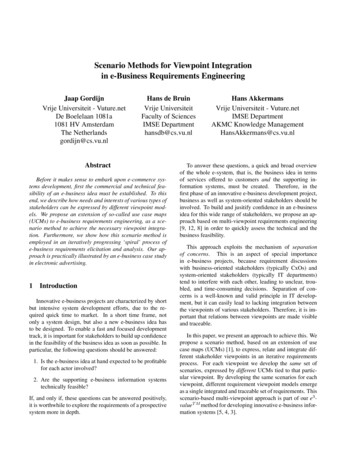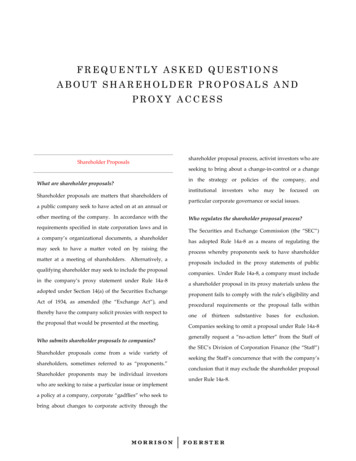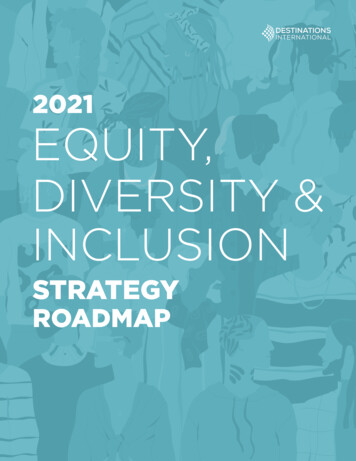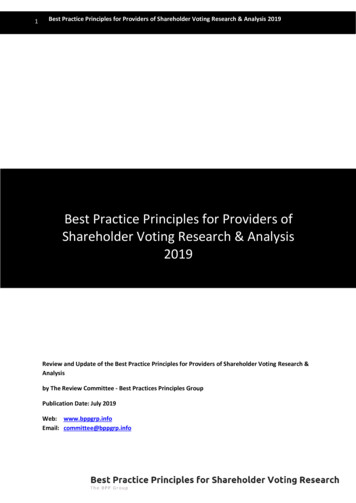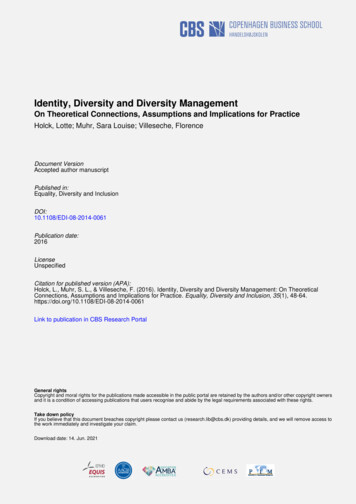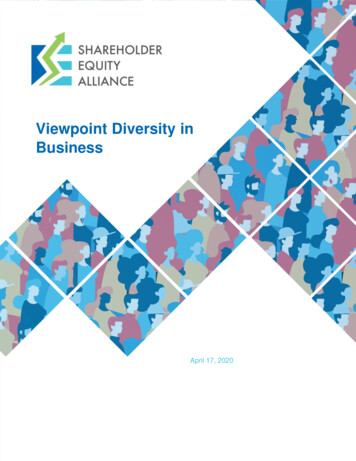
Transcription
Viewpoint Diversity inBusinessTitle heading twoApril 17, 2020
Viewpoint Diversity in BusinessViewpoint diversity is an essential component of corporate governance. Respecting different social,political, and religious beliefs in policy, governance, and the marketplace helps companies mitigate risk,improve performance, and better align business goals with shareholders’ interests. Promoting robustviewpoint diversity also enriches and strengthens society by fostering a culture that respects freespeech, religious tolerance, and open discourse.Companies generally recognize the importance of promoting diversity in terms of race, gender, andethnicity, but often fail to prioritize viewpoint diversity, which underlies and supports all other forms ofdiversity. This oversight is concerning given that respect for diverse perspectives and viewpoints has astrong positive impact on firm performance. Like sustainability, equity, and inclusion, viewpoint diversityis not easily measurable, yet it often plays a central role in defining a company’s duties to its customers,employees, shareholders, and society at large. Researchers, though, have successfully used politicalideology as a proxy for drawing conclusions about the relationship between firm performance and thelevel of political ideology in corporate boardrooms.1 Other proxies for viewpoint diversity includecorporate PAC spending, political endorsements and statements by a company or its executives,corporate membership in external groups and coalitions with particular social or political agendas,charitable giving, and corporate policies or practices that punish or endorse the expression of certainbeliefs and values.When companies have a narrow approach to diversity, for example, one which focuses on only genderor age, they forgo the many benefits associated with integrating other factors into their diversityframeworks.2 There is ample evidence that tolerance for a wide range of religious, social, and politicalviews in a company’s workplace, business affairs, charitable giving, and political engagement makesgood business sense. And research suggests that failure to include viewpoint tolerance as a factor incorporate governance can adversely affect a company’s reputation, workplace culture,competitiveness, and financial performance. It is common sense that alienating large groups ofpotential customers by marginalizing their beliefs or views is a bad business practice that harmsshareholder value.Viewpoint diversity is more than just a good business practice, it is essential to ensuring that companiesmeet their fiduciary obligations. As stewards of their investor’s capital, companies have a duty to ensurethat the decisions they make are in the best interest of shareholders. One major aspect of thisobligation is the responsibility to preserve the reputational integrity of their brands. In the Digital Age,businesses are under constant pressure to appeal to certain constituencies and their every decision isscrutinized. This environment presents major challenges. One wrong move can cost a business millionsin lost credibility and revenue. This is especially true when dealing with divisive social and politicalissues. When companies espouse controversial positions, they may please certain constituencies, butalienate others in the process. Striking the right balance is important for businesses that value theirIncheol Kim, Christos Pantzalis, and Jung Chul Park, Corporate boards’ political ideology diversity and firm performance, 21(c) Journal ofEmpirical Finance 223, 225 (2013).2Stephanie Creary, Mary-Hunter McDonell, Sakshi Ghai, and Jared Scruggs, When and Why Diversity Improves Your Board’s Performance,Harvard Business Review, (2019).1Page 1 of 8
reputation and focus on risk mitigation. Finding the balance requires that companies avoid echochambers that may cause them to overlook important opportunities or red flags. For every company,responsibly cultivating their public image means considering a wide range of different values andperspectives.Corporate Social and Political Activism Can HarmCompanies and ShareholdersIn its Closer Look Series, Stanford’s Graduate School of Business evaluated public views on CEOactivism and its impact on business interests. The study showed that CEO activism risks alienating atleast 1/3 of the public (approx. 70 million adults), with 35% of those surveyed objecting to CEOs oflarge companies using “their position and potential influence to advocate on behalf of social,environmental, or political issues they care about personally.”3Looking deeper, CEO activism in politics, religion, and contentious social issues “garner the leastfavorable reactions.”4 As Stanford reports:Of these issues, CEOs speaking up about gun control is the only one with a net-favorableposition (45 percent favorable versus 35 percent unfavorable). Abortion (37 percent versus 39percent), politics (33 percent versus 43 percent), and religion (31 percent versus 45 percent) allelicit net-unfavorable reactions . . . .5Data also suggest that CEO activism drives customers away. Stanford reported that while customersclaimed that they change their behavior based on agreement with a CEO’s position, the survey told adifferent story. Respondents were “significantly more likely to remember products they stopped using oruse less because of the position the CEO took than products they started using or use more.”6While CEO and brand activism on contentious social, political, and religious issues may build rapportwith some “employees, customers, or constituents,” it will also likely “alienate important segments ofthose populations.”7 For example, at least one study found that Nike’s high-profile advertising campaignfeaturing national-anthem protestor Colin Kaepernick led to “Nike’s brand favorability and purchaseconsideration ratings falling sharply across all demographic groups, even when segmented by age,race, and political affiliation.”8These findings are consistent with a 2020 survey indicating that 53% of respondents oppose brands“getting involved in political or cultural issues.”9 According to the poll, “[o]ne-third of respondents have3David F. Larcker, Stephen A. Miles, Brian Tayan, and Kim Wright-Violich, The Double-Edged Sword of CEO Activism, Stanford Closer LookSeries, 4 (Nov. 8, 2018).4Ibid.5Ibid.6Ibid.7Ibid.8Id. at 1.9PRWeek/Morning Consult: Time for brands to hold their tongues on (some) hot topics, ot-topics (last visited April. 1, 2020).Page 2 of 8
stopped buying products as a result of a brand stance.”10 Even studies that indicate general publicfavorability for corporate social and political activism are careful to note that many issues are still riskyventures. A Morning Consult poll found that while both Democrat and Republican customers are morelikely to buy products from companies that donate to charities that benefit veterans, the opposite is trueon issues like the U.S.-Mexico Border, transgender bathroom use, and same-sex marriage.11 Forexample, 59% of Republican customers said they were more likely to buy from brands that support theborder wall, while 61% of Democrats indicated that they would be less likely to do so.12While there may be general public support for corporate stands on less divisive issues, corporateactivism can “easily lead to lost sales and a lack of stock investment.”13 One poll notes that the majority(54%) of customers “have stopped using the products of a company because of its public opinion on anissue.”14 Corporate social and political activism also risks alienating shareholders and reducinginvestment. “[Forty-eight percent] of investors have decided not to invest in a company because of itsposition on an issue and 38% have sold their shares” for the same reason15This research suggests that companies should tread lightly when they are evaluating whether to takestands on contentious social or political issues. At the very least, they need to ensure that the issuesthey are engaging on are relevant to their business. A majority (51%) of respondents to the Aflacsurvey said that “large companies should take a stand on a social or political issue only if it directlyrelates to their industry, product, or services.”16 There are significant risks associated with corporateactivism in spaces where they do not have a direct business interest. In order to accurately weigh therisks and benefits, and strike the proper balance, management needs to account for a wide range ofvalues and perspectives. When corporations fail to promote viewpoint diversity internally, they makechoices that marginalize their customers, and shareholders.Ideological Diversity on Corporate Boards ImprovesPerformance and Increases Firm ValueThere is “robust evidence” that corporate boards comprised of ideologically diverse members contributeto “superior (firm) performance.”17 This diversity benefit holds even when tested in “various regressionmodels that control for other important corporate governance variables.”18 One reason for thispersistent performance boost is that when “outside directors maintain different views from10Ibid.Consumers Want Brands to Get Political, but Companies Need to Tread Carefully, Morning eed-to-tread-carefully/ (last visited April. 1,2020).12Ibid.13Aflac CSR Survey, Consumers, Investors Hold Corporations’ Feet to the Fire, 28-29 (2019), Id. at 28.15Ibid.16Id. at 26.111718Kim, et. al., supra note 1, at 227.Ibid.Page 3 of 8
management, (they) provide more objective evaluation of managerial decisions and plans.”19 This gainis especially significant given the generally strong evidence that “personal political affiliation” impacts abroad range of business decisions, including “portfolio composition, stock market participation, analysts’forecasting behavior, corporate social responsibility, and corporate policy decisions.”20 To ensure thatdecisions reflect the best interests of shareholders, customers, and employees, companies mustwelcome a robust range of ideas and viewpoints.Respecting viewpoint diversity also helps companies balance the potential risks and benefits of politicalactivism to ensure that their actions appropriately align with the fiduciary interests of shareholders.When corporations take stands on controversial social and political issues, they run the risk ofdamaging their reputational integrity and bottom lines.21 Moreover, insiders may face incentives to usea company’s political resources, (PAC spending, government relations, etc ), to further politicalagendas that are contrary to the firm’s interests as a whole.22 Effectively balancing the costs andbenefits of firm-wide political engagement, requires first assessing whether the issue is of materialrelevance to the company.23 And second, ensuring that political engagement aligns with the long-terminterests of shareholders. This is a difficult balance to strike and requires analyzing each case throughthe lens of a diverse range of social, political, and ideological perspectives at the c-suite and boardlevels.Evidence suggests that viewpoint diverse boards more effectively monitor firm political activity andminimize potential misalignment between management and shareholder interests. 24 In contrast,boards that lack ideological diversity, are less likely to prevent management from using firm resourcesto support political or social agendas that may harm the company and alienate customers andshareholders. This divergence between management and shareholders occurs because “decisions (ofa political nature) may be a product not merely of business judgement regarding what strategy willbenefit the company’s bottom line, but also of the directors’ and executives’ own political preferencesand beliefs.”25 Corporate political activity “might often have consequences that are exogenous to thefirm’s performance, and directors’ and executives’ preferences with respect to such spending might beinfluenced by these consequences.”26Suppose, for example, that the CEO of Company X happens to be a left-leaning Democrat whohopes to run one day for Congress in a left-leaning district in the Northeast, and the CEO ofCompany Y happens to be a conservative Republican who hopes to run one day for Congressin a conservative district in the South. We have no reason to expect that the shareholders ofeach company – or even a majority of the shareholders of each company – share their CEO’sbeliefs on political issues. Thus, to the extent that political speech decisions may be significantlyinfluenced by such beliefs, the interests and preferences of one or both the CEOs maysubstantially diverge from those of each company’s shareholders.2719Ibid.Id. at 229.21See Supra Footnote, 3, 9, 11, 13.22See Infra Footnote, 25.23See Infra Footnote, 26.24Id. at 226 - 227.25Lucian Bebchuk, and Robert Jackson, Corporate Political Speech: Who Decides?, 124 Harvard Law Review 83, 90 (2010).26Ibid.27Id. at 91.20Page 4 of 8
To prevent upper management from committing companies to actions or political causes that posebroad reputational and financial risks, boards should consider a wide range of backgrounds, values,and political ideologies. Unfortunately, this kind of balance is rare within major corporations. Accordingto one study, the political ideologies of incoming directors on corporate boards often “are significantlyaligned with that of existing directors, and particularly with outside directors.”28 A subsequent reportfound that “on the boards of the Fortune 10, every director with a political background served aDemocratic White House.”29 Similar trends hold in Fortune 100 boardrooms, where 67% of directorswith political backgrounds previously served in Democratic administrations.30 These numbers are evenhigher in the financial and tech sectors where 83% and 82% of board members with political experienceare former Democratic appointees and politicians.31 This data implies that board membership tends toskew toward one side of the ideological spectrum and lacks the balance of a broad range ofbackgrounds, perspectives, and values.This ideological homogeneity impedes boards’ ability to hold management accountable. By contrast,“board ideological diversity” allows for more effective oversight of company-sponsored PACs and “canhelp firms construct efficient political strategies” that reflect the interests and values of the company andits shareholders.32 Additionally, the “lower odds of sub-optimal management decisions with regards tocorporate PAC contributions”33 often contribute to improved “market valuation,”34since firms are lesslikely to use their political resources to engage in risky activities that undermine their reputations, orbusiness interests. Ultimately, shareholders benefit when boards reflect a wide range of beliefs andvalues.Despite strong evidence that viewpoint diversity promotes objective and balanced decision-making,many large corporations including AT&T,35 Salesforce,36 Amazon,37 John Deere,38 and Costco,39opposed recent shareholder proposals asking them to ensure viewpoint diversity on their boards. Thissignals a dangerous disregard for shareholder interests in at least two respects. First, it may indicatethat corporate boards are unaware of their own “ideological blind spots.” That is, they have become soone-sided with respect to the values and perspectives present, that they fail to recognize the need toconsider views beyond the prevailing outlook of incumbent directors. Second, opposition to boardviewpoint diversity means that companies are less prepared to mitigate the risks associated withoperating in an increasingly polarized political environment where one wrong move can alienatecustomers, employees, and shareholders – and inflict significant reputational damage.28Kim, et al., supra note 1, at 238.Political Risk Brief, Baron Public Affairs, -corporate-america/ (last visited April. 1, 2020).30Ibid.31Ibid.32Kim, et al., supra note 1, at 248.33Id. at 249.34Id. at 227.35Covington Settlement Warns Corporations That Bias Can Cost Big Bucks, National Center for Public Policy as-can-cost-big-bucks/ (last visited April. 1, 2020).36Salesforce.com, Notice of the 2019 Annual Meeting and Proxy Statement 72-73 (2019), n Inc., Notice of 2019 Annual Meeting of Shareholders 33-34 (2019),https://ir.aboutamazon.com/files/doc financials/proxy/2019-Proxy-Statement.pdf.38John Deere & Co., Notice of 2020 Annual Meeting and Proxy Statement 83-84 4199/20191231/NPS 414837.PDF.39Costco Wholesale Corp., Notice of Annual Meeting of Shareholders 25-27 (2020), 3ac1487c-b1e2-537861ee0031.29Page 5 of 8
Viewpoint Diversity is a Key Element of Dynamic andInnovative Workplace CulturesCorporations with “dominant political ideologies are likely to be inhospitable to those who thinkdifferently.”40 Revelations of major tech companies terminating employees who don’t conform toprogressive values has become common place and should worry shareholders.41 Employees who holdminority views, whether conservative or liberal, in ideologically homogenous organizations often “face ahostile climate,” where they “feel unwelcome and unwanted” and “experience alienation.”42 Thismarginalization often spurs employee departures and may affect companies’ ability to attract and retaindiverse talent. Research suggests that both conservative and liberal employees may depart firmswhere the internal culture is hostile to their values, with conservative employees slightly more likely todo so.43 This talent drain suggests that companies should ensure viewpoint diversity to foster cultureswhere employees of various ideologies, backgrounds, and religions feel welcome and included.In a fast-paced, dynamic business climate, a failure to respect viewpoint diversity can gravely affectcompanies. “Human capital is a vital resource for organizations, and in many cases a key source ofcompetitive advantage.”44 Some studies have shown that the loss of a key employee can “diminish afirm’s ability to retain clients and even to survive.”45 Ideologically homogenous cultures tend toundermine respect for different perspectives and can result in echo chambers that penalize those whobring diverse ideas and views to the table. Healthy, ideological give-and-take creates “productivetension” that can catalyze positive changes from within an organization.46Emerging research into cognitive diversity and how it impacts team performance supports this. In theirgroundbreaking research, Alison Reynolds and David Lewis found “no correlation between (genderand ethnic) diversity and (team) performance.” 47 Instead, they posit that greater “differences inperspective(s) or information processing” within teams may increase their effectiveness in solvingcomplex problems.48 Another meta-analysis examining the impact of gender diversity on corporateboard performance suggests that “if male and female board members are fairly similar in their values,experience, and knowledge, the addition of women to an all-male board may not increase the board’s40Y. Sekou Bermiss And Rory McDonald, Ideological Misfit? Political Affiliation and Employee Departure in thePrivate-Equity Industry, 61(6) Academy of Management Journal 2182, 2185 (2018).41Google engineer claims he was bullied, fired for being a conservative, New York Post.com, s-he-was-bullied-fired-for-being-a-conservative/ (last visited April. 1, 2020); Dozens at Facebook Unite to Challenge Its ‘Intolerant’ LiberalCulture, New York l (last visited April. 1, 2020); Google managerskept blacklists of conservative employees and one manager considered holding ‘trails,’ a new lawsuit alleges, Business leges-2018-1 (last visited April. 1, 2020).42Y. Sekou Bermiss And Rory McDonald, Ideological Misfit? Political Affiliation and Employee Departure in thePrivate-Equity Industry, 61(6) Academy of Management Journal 2182, 2185 (2018).43Id. at 2200.44Id. at 2184.45Ibid.46Id. at 2203.47Alison Reynolds & David Lewis, Teams Solve Problems Faster When They’re More Cognitively Diverse, Harvard Business Review (Mar. 30,2017), r-when-theyre-more-cognitively-diverse.48Ibid.Page 6 of 8
cognitive variety.”49 Diversity of values, knowledge, and experience among board members andexecutives are what matter most to business performance.One of the most significant internal barriers to fostering intellectually diverse cultures is the tendency forexecutives to “recruit in their own image.”50 “Colleagues gravitate toward people who think and expressthemselves in a similar way” leading to “functional bias” that stifles innovation and creativity.51 Forcompanies to remain competitive in the 21st Century, they must develop internal cultures that guardagainst “groupthink” and capitalize on the many benefits of robust viewpoint diversity and debate.ConclusionViewpoint tolerance is an important element of diversity and significantly impacts a company’s businessaffairs, charitable giving, political engagement, and workplace culture. Yet businesses often only pay lipservice to viewpoint diversity, or use false proxies for it like gender, race, ethnicity, or other physicalcharacteristics. Businesses should take meaningful steps to uncover internal echo-chambers hiding inplain sight. One-sided thinking can harm firm performance and shareholder value, but it often escapesdetection at major companies. When prevailing biases create environments where differing viewpointsare not tolerated, management may not recognize the problem until it is too late. The self-perpetuatingnature of viewpoint discrimination means that boards and management teams need to take steps todetect it and proactively ensure viewpoint diversity across the business enterprise.49Katherine Klein, Does Gender Diversity on Corporate Boards Really Boost Company Performance?, Wharton School of Business,University of Pennsylvania, (May 18, 2017), ance/.50Reynolds & Lewis, supra note 27.51Ibid.Page 7 of 8
Viewpoint Diversity in Business Viewpoint diversity is an essential component of corporate governance. Respecting different social, political, and religious beliefs in policy, governance, and the marketplace helps companies mitigate risk, improve performance, and better align business goals with shareholders' interests. Promoting robust
